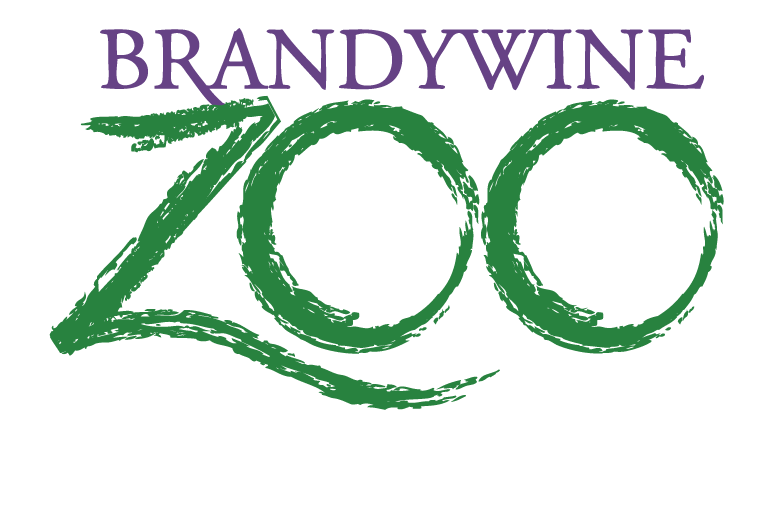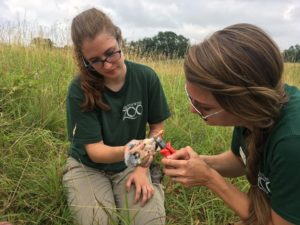Conservation Research Apprentice
DESCRIPTION
The Brandywine Zoo manages two in-situ conservation programs in Delaware. The first is monitoring endangered American Kestrels and the second is an urban wildlife monitoring project. Other additional projects may be added during the 2022 year, as time allows.
Kestrel Project:
The American Kestrel is North America’s smallest falcon species. Since the 1960s, kestrels have seen a decline of 88% in their population and in 2013 they were listed as Endangered in Delaware. More research is necessary to determine the cause of decline in this small, insect-eating bird, but evidence suggests that pesticide accumulation, increased predation by more urban-adaptable raptors, as well as habitat loss may be primary factors.
The Brandywine Zoo is a facilitator for the Delaware Kestrel Partnership, an American Kestrel nest box monitoring program that works with various nonprofit and governmental partners to study Kestrels in the state. Research Apprentices will be responsible for the maintenance and monitoring of kestrel nest boxes across the state of Delaware, logging data, and creating research parameters. The goals of this research is to identify where Kestrels are nesting, presence and absence, impact of habitat and invasive species pressures, and other baseline information for future research. Active Kestrel nests with chicks will be banded, and banding of adults will be attempted.
Urban Wildlife Monitoring Project:
The Brandywine Zoo has partnered with Lincoln Park Zoo’s Urban Wildlife Institute to passively monitor terrestrial mammals in an urban setting across northern Delaware. Camera traps are deployed for 4- week increments each season across a 20-30 point transect. Cameras collect images which need to be logged and inventoried.
Other Projects:
Other projects may be started in 2018, including anti-lead collaborative to reduce the impacts of lead ammunition contamination in vultures and other scavengers, copperhead snake telemetry, bird-strike awareness campaigns, and more.
LEARNING OBJECTIVES
- Research techniques; research methodology
- Bird of prey and terrestrial mammal identification; Plant identification
- American Kestrel natural history knowledge
- GPS/GIS applications; use of appropriate equipment including but not limited to GPS, GIS, motion-sensor cameras, etc.
- Grant writing
- Educational programming experience (teaching and writing); and data recording, analysis, and presentation.
- The position is physically demanding at times, requiring outdoor work in a variety of temperatures and sometimes challenging conditions. Candidates must be able to climb a 12 foot ladder.
- Must have a valid driver’s license and be able to provide own transportation to field sites.
- Must be able to lift at least 50 lbs.
REQUIRED SKILLS
- At least 18 years old with valid driver’s license and reliable transportation
- Provide proof of negative TB Test within the last 12 months before start date
- Good physical condition: able to stand/walk for extended periods of time, kneel, crouch, and able to work in all weather conditions.
- Be able to lift up to 25 pounds
- Must be fluent in the English language (verbal and written communication)
- Overall GPA must be 2.5 or higher
- Good organizational skills
- Able and willing to read and follow verbal and written work instructions and work independently
- Willing to assist with administrative, customer relations, and housekeeping tasks and possibly animal care
- Able to commit to upholding all Zoo safety and personnel policies, and support the overall mission
- Able to professionally represent the Brandywine Zoo in all interactions with visitors, staff, and other members of the community
- Complete a project of the intern’s own design, and approved by zoo staff, during the internship period
RESPONSIBILITIES
- Maintenance of currently installed Kestrel boxes in various state parks in DE (currently 50+ installed around the state, with more added each season).
- Site location identification and installation of new Kestrel boxes and wildlife cameras.
- Installing wildlife cameras and managing them for four data-gathering periods of one month at a time during the year.
- Outreach to potential partners for Kestrel or wildlife camera sites or program. Forming partnerships with DE-based governmental bodies and nonprofits
- Regular, weekly check-ups on Kestrel boxes during nesting season (Feb -July). Starling abatement.
- Logging data, data analysis, uploading data to, and communicating with, American Kestrel Partnership. Creation of reports on kestrels in DE.
- Installation of camera traps and analyzing camera trap photographs.
- Recruitment of volunteers to assist in kestrel monitoring or data analysis.
- Development of educational resources for the American Kestrel. Forming partnerships with local schools for kestrel box monitoring. Delivery of kestrel programming to school groups.
- Grant writing for continued support of research programs
Seasonal Breakdown: Winter (Jan-Mar)
- Trail camera placement and picture ID (year-round)
- Small mammal track tube surveys
- Kestrel Box preparation for season (cleaning and preparing for Kestrel use)
- Familiarizing yourself with locations, property owners, and zoo standards
- Meeting with people such as volunteers and landowners
- Training Kestrel and Urban Wildlife volunteers
- Kestrel roadside surveys
- Adult kestrel trapping/banding (once nesting begins)
- Begin launch of Single-Use Plastics campaign (make contact with local businesses)
Seasonal Breakdown: Spring (Apr-Jun) – busiest season
- Ensuring every box is being monitored by volunteer or yourself
- Start monitoring nest boxes
- Trail camera deployment and photo tagging (ongoing)
- Small mammal track tube surveys
- Kestrel and coyote roadside surveys
- Installation of monarch waystation at the zoo
- Adult kestrel trapping/banding; Kestrel chick banding
- Managing volunteer monitors
- Launch of Single-Use Plastics campaign (Earth Day)
Seasonal Breakdown: Fall (Oct-Dec)
- Fall maintenance of Kestrel boxes (cleaning them out) and installation of new boxes
- Trail camera deployment and photo tagging (ongoing)
- Monarch butterfly tagging
- Possible visit to Cape May Raptor Banding Project
- Kestrel and coyote roadside surveys
- Annual reports for projects
- Zoo animal behavioral data collection (as time allows)
- Continue Single-Use Plastics campaign by adding more local partners
All Delaware State Parks Interns are required to undergo and successfully complete a background check performed by the Division.

